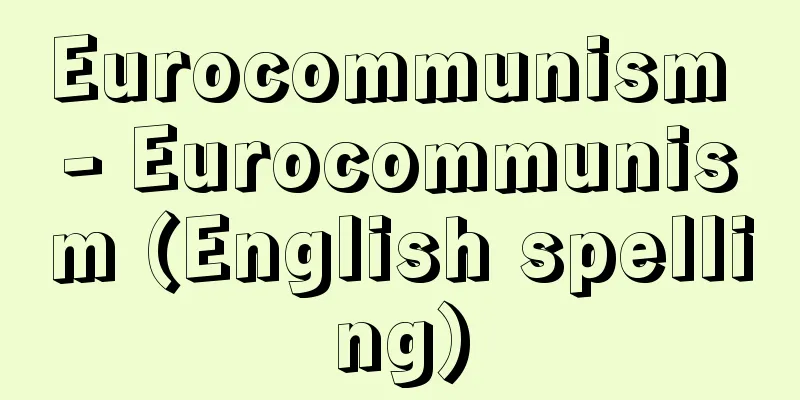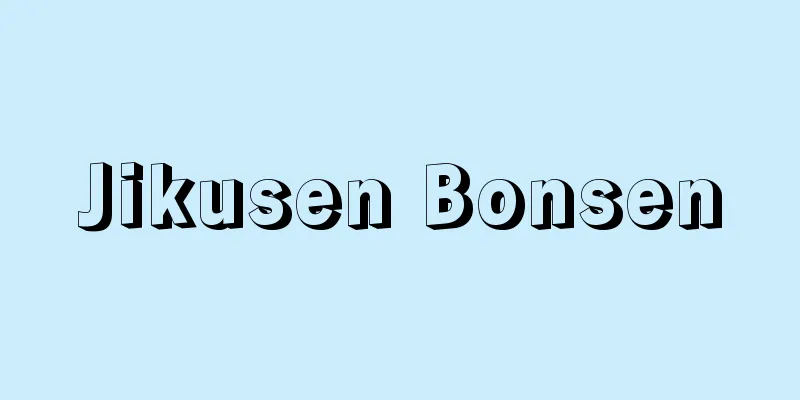Eurocommunism - Eurocommunism (English spelling)

|
A general term for the revolutionary line, policies, style of activity, and way of thinking of the communist movement, which was adopted in the 1970s mainly by communist parties in Western Europe, particularly the Italian Communist Party, the French Communist Party, and the Spanish Communist Party, and which differed from the traditional Soviet-style model. The term Eurocommunism itself was originally a journalistic term, coined by Levi, editor-in-chief of the influential Italian newspaper Stampa, who reported on the meeting between Italian Communist Party Secretary General Berlinguer and Spanish Communist Party Secretary General Carillo in July 1975. The communist parties that followed the Eurocommunist line were Italy, France, and Spain, but the communist parties of the UK, Sweden, Belgium, Denmark, Japan, Australia, and other countries also basically followed a similar direction. In this sense, Eurocommunism was a trend within the international labor movement and communist movement before communism as a whole collapsed with the Eastern European Revolution of 1989 and the collapse of the Soviet Union in 1991. The political and revolutionary line of Eurocommunism is characterized by its insistence on a national and democratic path to socialism, and its vision of a democratic and pluralistic socialism that is compatible with freedom and democracy. Eurocommunism originated in the criticism of Stalin at the 20th Congress of the Communist Party of the Soviet Union in 1956, and it began with the formulation of the "Italian Road to Socialism" by the Italian Communist Party. It stated that the Stalinist oppression in the process of building socialism in the Soviet Union was not simply due to Stalin's personal mistakes or personality cult, but was due to mistakes in political and social systems, and it was made clear that the process of transformation to socialism in Italy was not a model or imitation of the path taken by the Soviet Union, but rather an improvement of the social structure through democratic methods in compliance with the Constitution of the Italian Republic, which was the product of the anti-fascist struggle. Until then, the international communist movement had been led in both name and reality by the Communist Party of the Soviet Union, the world's first country to achieve a socialist revolution, and it often intervened in leadership changes in other socialist countries and in the formulation of political lines by the communist parties of capitalist countries. However, events such as the Sino-Soviet dispute, the Prague Spring in Czechoslovakia and its interventionist suppression by the Warsaw Pact forces (1968), combined with the progress of historical verification of the facts of the many oppressions during the Stalin era and the fact that the actual restrictions on freedom and democracy in the Soviet Union and Eastern European countries had become common knowledge among the people of Western Europe, led to the "movement away from Moscow" of the communist parties of Western countries, and the assertion of polycentrism and autonomy in the international communist movement. When the Prague Spring was suppressed, many communist parties criticized the Soviet Union and began to critically analyze the Soviet-style socialism as a whole. Furthermore, the experiences of the May Crisis in Paris and the rise of the labor movement in Italy, which broke out at the same time as the Prague Spring, made the communist parties of each country keenly aware of the need for a revolutionary course and political leadership different from that of the Soviet and Eastern European models in advanced Western countries.Furthermore, the experiment with a Popular Unity government in South America (1970-73) in Chile, including its experience of defeat, led to the concrete realization of the course of a peaceful transition to socialism through elections and parliament based on the majority of the people, which had also been approved by the 20th Congress of the Communist Party of the Soviet Union. Eurocommunism, which was formed in this way, concretely shaped the peaceful revolution line to suit the circumstances of each country, such as the "Left Alliance" of the French Communist Party and the Socialist Party, the "Historic Compromise" of the Italian Communist Party including the Christian Democratic Party, the participation of the Spanish Communist Party in the "Moncloa Agreement" after the overthrow of the Franco dictatorship, and the "Democratic Coalition Government" concept of the Japanese Communist Party. In this process, the term "dictatorship of the proletariat," which had already been abandoned by the Italian Communist Party, was either abandoned or redefined by the Communist parties of each country. The term "Marxism-Leninism" also fell out of use, as it was born from the revolutionary process in backward Russia and formulated during the Stalin era. Criticism of Soviet and Eastern European socialism led to a new conception of the image of socialism itself, using existing socialism as a negative example. In addition to respecting civil liberties and fundamental human rights, such as freedom of thought, speech, assembly, association, and publication, socialism would also recognize a multi-party system and democratic alternation of power, and it was defined as "self-managed socialism" and "pluralistic socialism," in which the individuality of individuals and the pluralism of society would flourish. However, the Eastern European Revolution of 1989 and the collapse of the Soviet Union in 1991 ultimately dismantled the existing Soviet and Eastern European style of socialism, leading to the collapse of the communist parties that had been in power. Many of the communist parties that had advocated Eurocommunism, such as the Italian Communist Party which transformed into the Left Democratic Party, abandoned communism altogether, disbanding or converting to social democracy. [Tetsuro Kato] "Revolution in Advanced Countries and Historical Compromises" by E. Berlingell, translated by Otsu Shinsaku (1977, Godo Publishing) " "Revolution in Advanced Countries and Pluralistic Socialism" by Taguchi Fukuji (1978, Otsuki Shoten) " "Eurocommunism and the State" by S. Carrillo, translated by Takahashi Katsuyuki and Fukazawa Yasuhiro (1979, Godo Publishing) " "Eastern European Revolution and Socialism" by Kato Tetsuro (1990, Kadensha) [References] | | |Source: Shogakukan Encyclopedia Nipponica About Encyclopedia Nipponica Information | Legend |
|
1970年代に、主として西欧諸国の共産党、とくにイタリア共産党、フランス共産党、スペイン共産党が採用した、ソ連型の伝統的あり方とは異なった共産主義運動の革命路線・政策・活動スタイル・思考様式の総称。 ユーロコミュニズムということば自体は、もともとジャーナリズム用語で、1975年7月のイタリア共産党書記長ベルリングエルとスペイン共産党書記長カリリョの会談を報じた、イタリアの有力紙『スタンパ』のレビ編集長の命名といわれる。ユーロコミュニズムの路線をとった共産党は、イタリア、フランス、スペイン共産党が代表的であるが、イギリス、スウェーデン、ベルギー、デンマーク、日本、オーストラリアなどの各共産党も基本的に同様の方向をとった。この意味で、ユーロコミュニズムは、1989年東欧革命、91年ソ連解体でコミュニズムの総体が崩壊する以前の、国際労働運動・共産主義運動内の一つの潮流であった。 ユーロコミュニズムの政治路線・革命路線の特徴は、社会主義へのナショナルで民主主義的な道の主張であり、自由・民主主義と両立可能な、民主主義的で多元主義的な社会主義を展望した。ユーロコミュニズムは、1956年のソ連共産党第20回大会におけるスターリン批判に起源をもち、それはまずイタリア共産党における「社会主義へのイタリアの道」の定式化により開始された。そこでは、ソ連の社会主義建設過程でのスターリン主義的抑圧が、単にスターリン個人の誤りや個人崇拝に起因するものではなく、政治的・社会的諸制度の誤りであったことが述べられ、イタリアにおける社会主義への変革過程は、ソ連がたどった道をモデルにしたり模倣したりするのではなく、反ファシズム闘争の所産であるイタリア共和国憲法を順守した、民主主義的方法による社会構造の改良であることが明示されていた。それまでの国際共産主義運動は、世界で初めて社会主義革命を達成したソ連共産党が名実ともに指導権を専守しており、他の社会主義国の指導者交代に介入したり、資本主義国の共産党の政治路線策定に干渉したりすることもしばしば行われていた。しかし、中ソ論争、チェコスロバキア「プラハの春」とワルシャワ条約機構軍によるその干渉的圧殺(1968)などの事態は、スターリン時代の数々の抑圧の事実の歴史的検証の進行と、ソ連・東欧諸国での自由と民主主義の制限の実態が西欧諸国民の常識として定着している状態と相まって、西欧諸国共産党の「モスクワ離れ」、国際共産主義運動における多中心主義、自主独立の主張を生み出し、「プラハの春」圧殺に際しては多くの共産党がソ連批判を行い、ソ連型社会主義全体をも批判的に分析するようになった。また、「プラハの春」と同時期に勃発(ぼっぱつ)したパリの5月危機やイタリアの労働運動高揚の経験は、西欧先進国におけるソ連・東欧型とは異なる革命路線と政治指導の必要を各国共産党に痛感させた。さらに南米チリにおける人民連合政府の実験(1970~73)が、その敗北の経験を含めて、ソ連共産党第20回大会でも承認されていた国民多数に依拠しての選挙と議会を通じての社会主義への平和的移行の路線を具体化させることになった。 こうして形成されたユーロコミュニズムは、平和革命の路線を、フランス共産党の社会党との「左翼連合」、イタリア共産党のキリスト教民主党を含む「歴史的妥協」、スペイン共産党のフランコ独裁打倒後の「モンクロア協定」参加、日本共産党の「民主連合政府」構想などのように、それぞれの国情にあわせて具体化していった。この過程で、すでにイタリア共産党では放棄されていた「プロレタリアートの独裁」という用語も、各国共産党により放棄ないし再定義された。「マルクス・レーニン主義」という用語も、後進国ロシアの革命過程から生まれスターリン時代に定式化されたものとして使われなくなった。ソ連・東欧型社会主義への批判は、社会主義像そのものを、現存社会主義を反面教師とした新しい構想に導いた。思想・言論・集会・結社・出版の自由など市民的自由と基本的人権の尊重はもとより、社会主義のもとでも複数政党制と民主的政権交代が認められるものとされ、「自主管理社会主義」「多元的社会主義」として諸個人の個性と社会の多元性が開花するものと規定された。 しかし、1989年の東欧革命、91年ソ連解体は、ソ連・東欧型の現存社会主義を最終的に解体し、その政権を担ってきた共産主義政党を崩壊に導いた。ユーロコミュニズムをかかげてきた共産党も、イタリア共産党の左翼民主党への変身をはじめ、多くは共産主義そのものを放棄し、解散したり社会民主主義へと転換していった。 [加藤哲郎] 『E・ベルリングェル著、大津真作訳『先進国革命と歴史的妥協』(1977・合同出版)』▽『田口富久治著『先進国革命と多元的社会主義』(1978・大月書店)』▽『S・カリリョ著、高橋勝之・深沢安博訳『“ユーロコミュニズム”と国家』(1979・合同出版)』▽『加藤哲郎著『東欧革命と社会主義』(1990・花伝社)』 [参照項目] | | |出典 小学館 日本大百科全書(ニッポニカ)日本大百科全書(ニッポニカ)について 情報 | 凡例 |
<<: Yurodivye (English spelling)
>>: Euro - Euro (English spelling)
Recommend
Enzy - Enzy
...The seasoning used is fish sauce made by salti...
Lower Canada
The old name of the Canadian province of Quebec. I...
Ananta - Ahh what?
...The constitutional revolution (1932) occurred ...
Hemorrhagin
...Venomous snakes of the Viperinae subfamily in ...
McMahon, H. (English notation) McMahonH
…the border between northeastern British India an...
Centrifugal compressor
A compressor is a machine that rotates an impeller...
Right dressing room - Uhou no gakuya
...A standard dressing room faces the front audie...
Red cornetfish - Red cornetfish (English spelling)
A marine fish belonging to the family Cornetidae ...
premolar
… The fourth change is the change in homodontia, ...
Nitroglycerin - Nitroglycerin (English spelling)
Nitric acid ester of glycerin. Abbreviated as NG....
Taxpayers' suit
… The citizen audit request is a system of volunt...
Tax accountant - Zeirishi (English spelling)
Tax professionals. Their mission is to ensure tha...
John Dos Passos
1896‐1970 American novelist. His parents were comm...
Otowa Falls - Otowa Falls
…It was around this time that the Kiyomizudera Pi...
Kaminada River
...It is a long, narrow town facing the Iyo Nada ...









